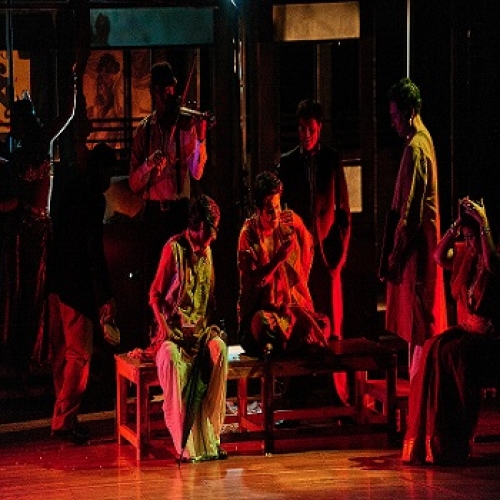
Mahabharata
If human beings are essentially peace-loving, why do wars take place? Does an individualistic sense of truth and justice lead to an apocalypse? Mahabharata, the eternal epic, reflects on this basic contradiction in human existence.
If human beings are essentially peace-loving, why do wars take place? Does an individualistic sense of truth and justice lead to an apocalypse? Mahabharata, the eternal epic, reflects on this basic contradiction in human existence.
The play uses the consciousness narrative of 15 characters to explore inner dilemma and whether each character choosing differently could have averted war or are we doomed for destruction?
CAST
Anurupa Roy
Bangarakkha (Narrator)/Draupadi/Gandhari/Dushassana/Amba/Warrior who kills Abhimanyu/Karna/Kunyi/Drona
Mohammad Shameem
Shadow Puppets/Shakuni/Amba/Warrior who kills Abhimanyu/Drona/Karna/Ashvatthama/Dushassana
Avinash Kumar
Yudisthir/Shadow Puppeteer/Amba/Abhimanyu/Drona/Karna/Bhima/Jayadrata
Vivek Kumar
Sillakayata(Narrator)/Dushassana/Bhishma/Warrior who kills Abhimanyu/Drishtudumna/Shalya/Duryodhan
Gundu Raju
Storyteller/singer/Dronacharya/Viddhashakta/Krishna/Yudishthir
CREW
Milind Shrivastava
Light Design
Suchet Malhotra
Original Music Score
Anamika Mishra
Script
Atul Sinha
Animation
Mohammad Shameem
Puppet Design & Construction
Asha
Assistance
S. Chidambara Rao
Shadow Puppets
Avinash Kumar
Choreography
Gundu Raju
Shadow Puppets and Script Advice
This performance with puppets, masks, shadow puppets and materials looks at the Mahabharata as a dynamic narrative which has evolved over a few thousand years through the sung verses of Togalu Gombeyatta’s Sillakeyata Mahabharata and remains relevant in the new search of contemporary puppeteers. The story itself is increasingly relevant in the polarised conflict-ridden world of today. The characters then become archetypes for conflicts, small and large, whether in world politics or the family or community and the narrative is an overarching metaphor for many political, institutional, social situations in the world today. But our central question is what could have averted the Apocalyptic Mahabharata war? What choices could each character have altered? And what choices can each one of us alter? What fixed beliefs must be questioned and let go of in order to prevent such a war in the future? Can we start by acknowledging that none will survive such a war and thus it must be prevented?